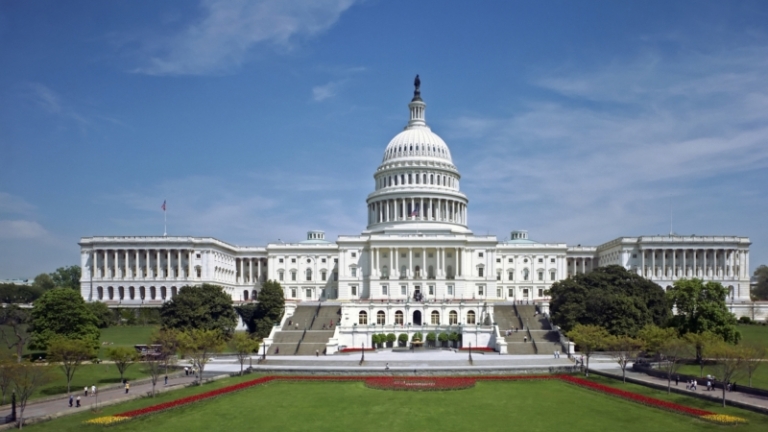
Trump Visits Israel and Egypt After Gaza Ceasefire Takes Effect
On October 13, President Donald Trump traveled to Israel and Egypt to celebrate the Gaza ceasefire deal. He addressed the Knesset before heading to Egypt, where he and Egyptian President Abdel Fattah el-Sisi co-hosted a signing ceremony attended by more than 20 world leaders—but notably not Israeli Prime Minister Benjamin Netanyahu, who declined to participate.
Speaking on Air Force One on October 12, Trump said that the Gaza war was over and that the ceasefire will last because “everybody is happy.” He indicated that the “Gaza Riveria” idea that he touted earlier this year would be put on hold in order to prioritize Gaza’s reconstruction. The US president also said that the proposed “Board of Peace” to oversee Gaza’s governance will be set up quickly, but questioned whether former British prime minister Tony Blair, named in Trump’s 20-point plan as a potential member, will assume a role.
In his Knesset speech, Trump said that this was “the historic dawn of a new Middle East” and that Israel’s triumph was backed by US weapons. He praised Netanyahu for taking the “victory,” telling him, “You’re going to be remembered for this far more than if you kept this thing going, going, going, kill, kill, kill.” Trump asserted that wealthy Arab and Muslim countries would contribute large sums to Gaza’s reconstruction, and predicted that Iran would make peace with Israel and the United States. Trump also asked Israeli President Isaac Herzog to pardon Netanyahu for his corruption charges, prompting applause from Knesset lawmakers.
Trump then flew to Sharm el-Sheikh in Egypt for the Palestinian-Israeli Peace Summit, where the leaders of Egypt, Qatar, Turkey, and the United States signed a document that Trump said spells out “rules and regulations” for the ceasefire. Trump praised Egypt’s role in mediating the ceasefire, saying that el-Sisi “was very instrumental because Hamas…respect[s] the leadership of Egypt.”
Also happening in Washington last week…
I. Legislative Branch
1) Legislation
Bipartisan Legislation Condemns Hamas and Anti-Semitism. On October 7, Sens. Joni Ernst (R-IA) and John Fetterman (D-PA) introduced S.Res.438, condemning Hamas’s October 7, 2023, attack on Israel and the use of rape as a weapon of war, opposing “antisemitic” protests, supporting “the forever survival of Israel,” and calling for the release of all hostages. On the same day, Sen. Peter Welch (D-VT) introduced S.Res.439, condemning “antisemitic hatred.”
On October 8, Rep. Josh Gottheimer (D-NJ) introduced H.Res.795, condemning Hamas’s October 7 attack and calling on the group to immediately and unconditionally surrender and release all hostages. Gottheimer also introduced H.R.5714, which directs the United States Holocaust Memorial Museum to develop a secondary school curriculum on Hamas’s attacks against Israel, “the history of antisemitism and how it played a role in the attacks, and denial and distortion as a form of antisemitism in the wake of the attacks.”
Bill Seeks to Bar Entry of Foreign Nationals Who Follow Sharia Law. On October 8, Rep. Chip Roy (R-TX) introduced H.R.5722 to prohibit foreign nationals who adhere to Sharia law from entering or remaining in the United States.
Senate Passes FY26 Defense Bill. On October 9, the Senate passed S.2296, the Fiscal Year 2026 National Defense Authorization Act (NDAA), by a vote of 77 to 20. The bill includes a repeal of the 2019 Caesar Act that imposed sweeping sanctions on Syria, as well as provisions to continue a US counterterrorism presence in Syria and to reopen the US embassy in Damascus. The NDAA also authorizes continued “train and equip” support for the Lebanese and Jordanian Armed Forces and funding for various US-Israel military cooperation programs.
Senate Resolution Congratulates Trump for Gaza Ceasefire. On October 10, Sen. Bernie Moreno (R-OH) introduced S.Res.445, congratulating President Trump for “achieving peace in the Middle East.”
2) Personnel and Correspondence
House Lawmakers Oppose Ireland’s Israel Boycott Effort. On October 6, Rep. Josh Gottheimer (D-NJ) led 22 lawmakers from both parties in a letter to Irish Prime Minister Micheál Martin, warning that Ireland’s proposed legislation to criminalize the import of Israeli goods from the West Bank and East Jerusalem would harm Ireland’s economic relationship with the United States.
Democrats Urge Release of Americans Detained in Israel. On October 7, Rep. Ro Khanna (D-CA) led 24 other House Democrats in a letter to Secretary of State Marco Rubio calling for the release of American citizens detained during Israel’s interception of the Global Sumud Flotilla on October 1 and 2.
II. Executive Branch
1) White House
Trump Announces Israel and Hamas Agree to First Phase of Gaza Ceasefire Deal. On October 8, during a White House event on “antifa,” President Trump announced that negotiators were “very close to a deal in the Middle East.” The announcement came as Special Envoy Steve Witkoff, Trump’s son-in-law Jared Kushner, Qatari Prime Minister Mohammed bin Abdulrahman Al Thani, and other senior officials joined a third day of peace talks in Egypt. After the meeting, Trump announced on Truth Social that “Israel and Hamas have both signed off on the first Phase of [the] Peace Plan,” saying that hostages in Gaza would be released “very soon” after Israel withdraws its troops “to an agreed upon line” in Gaza. He thanked Egypt, Qatar, and Turkey for helping to secure the deal.
2) Department of State
Rubio Meets with Kuwaiti Official. On October 6, Secretary Rubio met with Kuwaiti First Deputy Prime Minister and Minister of Interior Fahad Yousef Saud Al Sabah to discuss the release of hostages, ending the war in Gaza, and the US-Kuwait strategic partnership.
Rubio Speaks with British Foreign Secretary. On October 7, Rubio spoke with British Foreign Secretary Yvette Cooper to discuss Trump’s 20-point peace plan, the release of all hostages in Gaza, and ensuring that Hamas has no role in Palestinian governance.
Department Targets Iranian Petroleum Trade. On October 9, the Department sanctioned some 40 individuals, entities, and vessels for involvement in the trade of Iranian petroleum and petrochemicals.
3) Department of War
CENTCOM Forces Conduct Strike in Syria. On October 2, US forces conducted a strike in Syria, killing Muhammad Abd al-Wahhab al-Ahmad, a senior member of al-Qaeda affiliate Ansar al-Islam.
AFRICOM Strikes Somalia. On October 3, US forces conducted an airstrike against the so-called Islamic State in Somalia.
Hegseth Announces Qatari Air Force Facility at Idaho Base. On October 10, Secretary of War Pete Hegseth announced that the United States and Qatar have signed a letter of agreement to build a Qatari Emiri Air Force facility at a US Air Force base in Idaho, which will host Qatari F-15 fighter jets and pilots.
CENTCOM Commander Visits Gaza, Reaffirms No US Troops to Be Deployed There. On October 11, CENTCOM Commander Adm. Brad Cooper said that he had just returned from a trip to Gaza to discuss the creation of a CENTCOM-led “civil-military coordination center” in Israel to monitor the ceasefire and to “support post-conflict stabilization” in Gaza, emphasizing that no US troops will be deployed inside the Strip. Media reports indicate that the United States will send some 200 servicemembers to the coordination center.
4) Department of the Treasury
Treasury Sanctions Iranian Oil Network. On October 9, the Department of the Treasury’s Office of Foreign Assets Control (OFAC) sanctioned more than 50 individuals, entities, and vessels involved in facilitating the shipment and sale of Iranian oil and liquefied petroleum gas.
Treasury Sanctions Actors Supporting Iran-Aligned Militias in Iraq. On October 9, OFAC sanctioned a network of eight individuals and entities for providing support to Iran’s Islamic Revolutionary Guard Corps, its Quds Force, and two Iran-aligned militia groups in Iraq.

